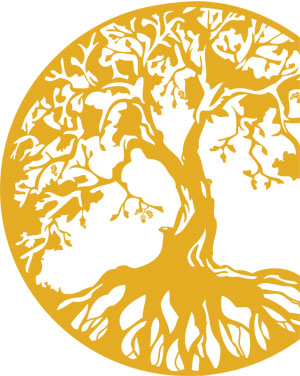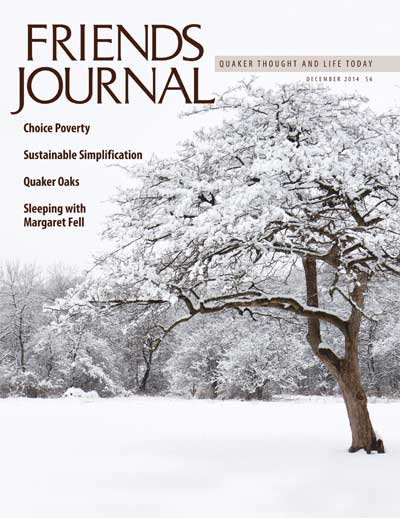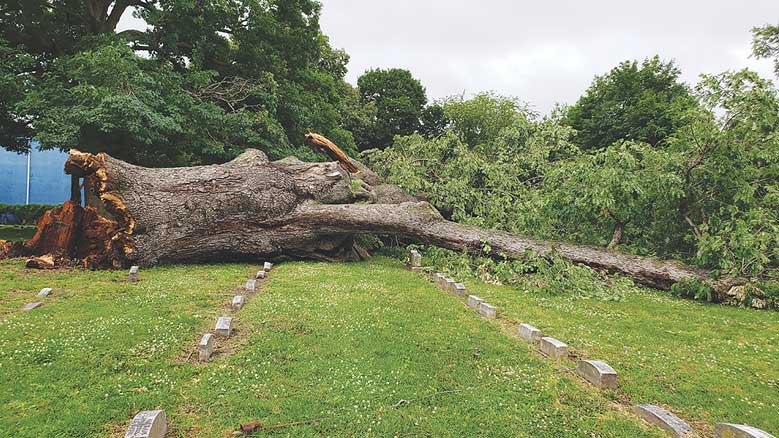 We’ve got a big white oak tree (Quercus alba) on our meetinghouse grounds. It’s out beyond the carriage shed on the edge of the old, African American section of our cemetery. Some people think it’s the original Great Oak, the one that was here when William Penn’s Manor of Richland was established in 1703, the one under which the surveyors met with the local Lenni Lenape Indians to try to explain how their world was going to be changing; it isn’t, though. That one blew down in about 1875 and was cut up for firewood.
We’ve got a big white oak tree (Quercus alba) on our meetinghouse grounds. It’s out beyond the carriage shed on the edge of the old, African American section of our cemetery. Some people think it’s the original Great Oak, the one that was here when William Penn’s Manor of Richland was established in 1703, the one under which the surveyors met with the local Lenni Lenape Indians to try to explain how their world was going to be changing; it isn’t, though. That one blew down in about 1875 and was cut up for firewood.
We haven’t had our Great Oak bored to count rings and find out just how old it is, but it’s old and big. About four years ago, we had it measured and scored by the Champion Tree Program of the Pennsylvania Forestry Association before our community celebration for the 300th anniversary of Richland Meeting in Quakertown, Pennsylvania. It’s growing in what used to be a swamp, so it’s a little stunted; at only 66 feet tall, it has a spread of 94 feet and a circumference of 189 inches. That gives it an official rating of 276 points. Here in Upper Bucks County, where all of the woods are second and third growth, it is an impressive looking tree. We’re proud of it, but it’s not even in the top 40 of the rated white oak trees in the state. The Champion (380 points) is on the grounds of London Grove’s meetinghouse in Chester County, Pennsylvania.
Many Quaker meetings around here in southeastern Pennsylvania have their own Great Tree. Plymouth Meeting, Concord Meeting, and the Penn Hill meetinghouse of Little Britain Meeting all have registered trees. It might be relatively common because many meetinghouses, like ours, have been here for a long time, and many of the trees often have been left undisturbed. There are other Great Trees associated with the Religious Society of Friends, too. Swarthmore College, founded by Quakers, and Pendle Hill, a Quaker study center in Wallingford, Pennsylvania, have registered Champion Trees. Haverford College (also founded by Quakers) has two. It’s always been like that with Friends and trees. The Great Elm of Shackamaxon, under which William Penn and Lenape leader Tamanend signed the Treaty of Amity and Friendship, was renowned and honored 330 years ago.
“Why do you think that is? What’s with Quakers and their trees?” I once asked a fellow Friend.
“It’s because Quakers are environmentally conscious. We think about the earth and practice stewardship of our world’s resources,” she idealistically and a bit smugly explained.
“So do a lot of non-Quakers,” I argued. “And, there wasn’t much stewardship of the forests going on back in 1683. They were hacking and sawing like mad. You can’t attribute twenty-first-century concerns to seventeenth-century people. Trees are a renewable resource. Stewardship doesn’t necessarily mean letting them all grow big, dubbing them Great Trees and hanging plaques on them. There’s something else going on here.”
I pondered the conundrum for a little while. Then a possible explanation occurred to me. Quakerism first came to life and grew to strength in northwest England and in Wales. Those are areas of the United Kingdom that had most retained the pre-Christian, Celtic culture, in Wales especially. Before the Angles and Jutes, before the Romans, much of the culture and religion of the original Britons involved trees.
A large percentage of the first settlers of Pennsylvania came from Wales. Bristol and Liverpool—English cities on the Welsh border—were Quaker strongholds, and many ships sailed for America from there. Welsh names can still be found scattered across a map of the Philadelphia area. Richland, my monthly meeting, was originally a part of Gwynedd Meeting, certainly a Welsh name. Many of the founding fathers and mothers at Richland had emigrated from Wales, or were the children of those who had. And, as any student of British history can tell you, the ancient Welsh liked trees.
Many societies throughout history have practiced dendrolatry (tree worship) or in some way built a mythology around trees. Observing the growth and death of trees, seeing the seasonal decay and revival of a tree’s vitality, appreciating a tree’s strength and elasticity, early humans saw them as symbols of life, death, and resurrection. In fact, the most ancient, cross-cultural symbolic representation of the structure of the universe is the world tree motif. And, the tree of life symbol is a concept that is not restricted to Judaism and Christianity.
The religion of the Celts, a tribe or race that arose in central Europe and spread into the British Isles, was especially noted for its reverence for trees. Almost every species of tree in Celtic countries was thought to have special powers. The oak, ash, and thorn trees were the most revered: a magical trio. The English term druid, a Celtic priest or highly-educated person, stems from the Latin word druidae whose root is dru-, which means “oak.” The Celtic word dair and the modern Welsh word derwen also mean “oak” and stem from the same root word.
The oak tree played an important role across Celtic culture. According to first-century geographer Strabo, the Celts of Asia Minor gathered in the sacred oak grove Drunemeton. Pliny the Elder described a festival on the sixth day of the moon in which druids climbed an oak tree, cut off a sprig of mistletoe, and sacrificed two white bulls as part of a fertility rite. Druid priests always made their wands from yew, apple, or oak wood. Under Roman occupation, the Britons worshipped Daron, the goddess of the oak tree. Her name continues to be commemorated by the name of a stream in Gwynedd (Wales).
The Celtic culture, like most others of the period, was polytheistic. Each tree had a specific power and a specific god associated with it. However, the Celts did believe in one overall ruling force, in a supreme spirit of the universe, in an all-powerful God. This core belief led to the Britons’ rapid and early conversion to Christianity as the Word spread across the Roman Empire. Saint Patrick encountered the sacred oak of Mugna in Kildare, Ireland, but was successful at converting the Irish to his faith and practice.
The Britons’ sacred associations with trees, especially the oak, survived their conversion to Christianity. Saint Brigid’s monastery was at Cill Dara (church of the oak), Saint Colm Cille was at Daire Calgaich (Calgach’s oak grove), now known as the city of Derry, or Londonderry, in Northern Ireland. In another example, the etymology of Durrow, a small rural village in County Offaly, Ireland, stems from the Celtic dair magh (oak plain). In Welsh mythology, magicians Gwydion and Math use oak flowers in making the beautiful Blodeuwedd. Blodeuwedd’s husband, Lleu Llaw Gyffes, escapes death at the hands of his wife’s lover by turning into an eagle and alighting in a magical oak tree. Merlin, the wizard featured in Arthurian legend, is imprisoned in an oak tree. Among the Welsh, the ancient influences of uncounted generations of tree worship persisted well into the second millennium of the Christian Era.
In 1653, Morgan Floyd, a priest at Wrexham in Wales sent two of his parishioners to the north of England “to trie the Quakers,” and bring back information on them. George Fox wrote of this investigation: “When these triers came down among us the power of the Lord overcame them and they were both of them convinced of the truth.” They returned to Wrexham, and soon, all Wales “was alive with” Quakers.
James J. Levick, through his study of Welsh Quakers, became convinced that “for generations the Welsh people have been congenially disposed to piety.” He believed that “moral attributes of character may be the subject of inheritance as well as physical traits, and the ancient Britons were religious people in their earliest history.” Stonehenge, and other monuments across Briton, have existed in various manifestations for over 5,000 years and are testimony to Levick’s assertion.
The religion taught by the ancient druids, teachers, and bards may be considered pagan and in error today, but their beliefs were rooted in a sincere search “for truth and in an adherence to the principles of peace and justice.” The pre-Roman Britons also recognized one Supreme Being. Their religious practice, Levick said, “called for a severe and inflexible morality.” Another early writer said of the pagan Welsh religion, “it comprehended all the leading principles that tend to spread liberty, peace, and happiness among mankind.” Their religion was no less compatible with Christian morality than was Judaism.
The Britons and Irish accepted Christianity and had been practicing a primitive form of it for hundreds of years before the Roman Church was introduced to the islands in the fifth century. Stemming from the druid days, it was a Briton’s belief that it was his birthright to think for himself in matters of religion and politics. A belief in that “inheritance” persisted under the guidance of the Catholic, and then Anglican Church. The Welsh had always resisted English rule and rigid religious doctrine. Hence they were willing to “trie the Quakers,” and then eagerly accepted the freedom of thought and worship that Fox’s Religious Society of Friends offered.
Having been persecuted and suppressed by the Saxons and English since the death of Arthur, the Welsh were not surprised when the same treatment was perpetrated on the Friends by the government and the established church. Second-class citizens of Great Britain for a thousand years, the poor, pious people of Wales—a land that “was alive with Quakers”—eagerly joined Penn’s Holy Experiment and relocated to the Delaware Valley in Pennsylvania in large numbers. They brought with them an ancient heritage that holds Great Trees sacred and imbued with spiritual power and magic.
I don’t pay attention to that kind of stuff, so I’m not sure if we’ve got any Welshmen in Richland Meeting. We don’t have any Llewellyns or Morgans or any other obvious family names. In fact, many of us are convinced Friends who are from old, local German families. But, as far as I can tell, we’re all just Americans, long since blended into the melting pot. We’re more likely to wear an Eagles t-shirt and throw baseballs at the Phillie Phanatic than to worship a tree—on the surface, at least.
We might not worship nature, but stewardship is one of our Quaker SPICES (an acronym for the Quaker values of simplicity, peace, integrity, community, equality, and stewardship). At Richland Meeting, we have our fair share of environmentally alert members and even a couple of militant tree-huggers, but, like I said, that’s a characteristic of this century. Our Great Oak Tree has roots that go much deeper than the environmental movement. An aura or energy seems to exude from it when the light is just right, or the observer is in the proper frame of mind. I wouldn’t attribute that to the spirit of Daron, the Oak Goddess, but who knows about those deep, mystic roots we’ve inherited?
So, because of that and the way I feel when I sit and meditate out under our Great Oak on a summer afternoon, I’m sticking with my explanation. I think all these great trees across Quakerdom have got something to do with Stonehenge and druid wizards dancing in the moonlight. The umbrella of Quakerism is easily broad enough to accept that connection, isn’t it?








Read your article with considerable interest, thank you for it. Might I make a few comments – the Morgan Floyd, to which you refer, and I am sure you rely on Levick, was actually called Morgan Llwyd, and was a priest at Wrexham and a keen supporter of the Parliamentarian cause. He wrote in both Welsh and English and his Welsh contributions are considered an important elemnt in the development of Welsh literature – his classic wascalled Llyfr y Tri Aderyn [Book of thr Three Birds]. He admired the Quakers and wrote as such to his mother, and indeed some of his phrasing reflects Quaker inclinations. I very much doubt the contention that Wales was ever alive with Quakers but they did establish themslves in certain localities. They were I am sure, as in England in the main from the yeoman class, such that the body of people living in Wales were never touched by the Quaker message and they adhered to the old mother church as Anglicans. The Second CivilWar was by some called the Welsh revolt and showed allegiance by the majority in Wales to the monarchial cause, whilst most Quakers would have had Parliamentarian leanings – as you say more accepting of freedom of thought. Levick, being of his time, over-romanticises – I doubt whether we have ‘congenially disposed to piety’ if so, no more than anyone else!
Often, these trees were planted for shade. Shade for the meeting house, the carriage house, and earlier for the horses waiting outside to take the folks home. usually planted on the southwest corner of a structure, a tree would shade the building throughout the day. Dropping its leaves in winter allowed the sun to penetrate and heat the building up. All before modern conveniences. I enjoyedmedia pa your article.